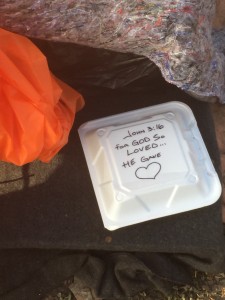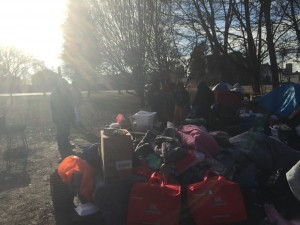It’s mid-morning on Monday, December 29, 2014. The air is crisp and clear and the light is shining through a slight morning frost/haze as the sun will surely burn it off and present the day. I’m in Downtown Detroit, just off I-75 on East Larned a block behind Jefferson. It’s 26 degrees and the almost empty field in front of me is called Lafayette Park. On a warmer day and, perhaps, at a later hour, the park would have a few people enjoying the setting, maybe eating a box lunch or just enjoying the surroundings. But today that scene is more spartan with not a person in sight save a small enclave of pop-up tents off to the side of a line of barren trees that are serving as the home to a sprouting community of homeless people. In fact, even though the trees are barren and the park is empty, if you are not looking, chances are you might not even notice what has quickly become know as “Tent City”

Last week I posted to my Facebook page an article from the Detroit Free Press, a story about a small group of homeless people who have set up camp here in an attempt to have a place to stay. There are eight tents that make up “Tent City”, and the “residents” there are, to a person, friendly, well presented, and quite kind to this guest to their community. For the most part they are gracious, open, and willing to share their stories, at least to a degree. It might be a bit surprising to some of you readers to learn that, in spite of the cold temperatures, the members of this community, who slowly appear from their tents the longer I am there, are happy people. They greet each other they way most families do upon awakening. Good morning and a hug or two. A handshake and a nod of the head, or just a recognition that another day is upon them.
“When people come though here I just want to show them that this is a community and even though people have their issues, or whatever, that we want to get people off the street and just give them a place to stay just to live and have some fun. And this is, so far, what it is.”
I am there to interview Charles Jones, known as CJ. He is “almost” 51, and he made sure he emphasized the word almost, not quite there yet and in no hurry for the calendar to turn on him. If you think living on the street for nine years, as CJ has, adds years to your life, it skipped CJ. He is energetic, enthusiastic, and looks much younger than his almost 51 years. He welcomes me with a hug and a handshake and breaks into a soliloquy that is reminiscent of poetry, in many ways. He speaks words with passion, recognizing that God gave him an ability to speak well, and he does. CJ is not proud or arrogant. He is not hell-bent on you agreeing with him and, in fact, doesn’t really wait for a reaction or a response from you as he speaks his truth. CJ has a message to share, and he will share it with whoever will listen.

But, like all of the residents of “Tent City”, CJ has a story. Born and raised in Birmingham, AL, CJ found his way to Detroit in 1979 and fell in love with the city. A retired United States Marine, CJ became a skilled trades carpenter upon his arrival here and did well for himself at first. But, like many in the 1980s, his job opportunities dried up when the economy went sour and he ended up like many, working odd jobs from time to time, waiting for the economy and his opportunities to improve. When promises became just words and he found himself unable to make ends meet, he found that living on the street was something that just had to be. Judge him for whatever it is you might think he did or didn’t do right, but he found that, although his intentions were good, not everyone was willing to give him a chance, including our government that, to this day, provides far too little to the men and women who wear a military uniform of this country once they leave their service.
He told me emphatically that he is not good at talking about himself, and would rather not, but that doesn’t mean he doesn’t have anything to say. To the contrary, he has plenty to say and, as I stated earlier, says it quite well.
“Tent City”, which CJ affectionately referees to as “Tinsel Town”, is his baby. It originally started at Belle Isle and has moved a few times, including to Hart Plaza, where they were asked to move at the urging of Detroit Mayor Mike Duggan. Their current spot is where they now call home and the police, or anyone else for that matter, do not bother them.
I asked CJ (the residents of Tinsel Town call him the Mayor) to tell me what he hoped this small family of people out here represent. He said that, “When people come though here I just want to show them that this is a community and even though people have their issues, or whatever, that we want to get people off the street and just give them a place to stay just to live and have some fun. And this is, so far, what it is.”
Fun? Yes, fun, and you might be shocked how well adjusted and happy these people are to have one another. I was.

As you look around you see plenty of supplies. Blankets, clothing for men and women, chairs, tables, water, pop, cereal, plates, dishes, and two grills. One of them is used mainly to keep them warm; the other is to cook the food that is dropped off on a regular basis by people who just want to help.
There is a larger goal to this loosely organized group, as well. CJ makes it clear to me and points out many times during my time there that there isn’t a person there that doesn’t have an employable skill and that all of them WANT to work. He introduces me to Doug who was a plumber for 25 years. As he introduces me to Shorty and Robert and others, all of whom have employable skills but have not been able to find steady work, my impression is that, for many of them, it’s next to impossible to find where the jobs are. And then, once they find potential jobs, making themselves presentable to an employer is equally difficult.
“I’m trying to raise awareness, I want to get people off the street. I want them to be safe and not feel threatened. There was this brother named Eric that came out here with his family and they helped us a lot. He said he was going to go find out what the City ordinances are so that we can look into finding a home and building a boarding house for people. I want to protect people from the cold and the snow and to keep them off the streets.”
Many of them are not very outgoing and are quite reserved. What they would love to have, their dream, is for someone to help them find an abandoned home and for them to use the skills they already possess to rehabilitate that house so that other homeless people have a temporary place to lay their head at night without worrying about bed bugs or being in danger or snow or cold. They believe that, if given the chance, they could rehab homes all over the city with donated items and the goods that people would bring to them would be properly used and appreciated. CJ is confident that, given that opportunity, they would soar. It’s hard to not believe him when you look into his eyes.
According to CJ, “I’m trying to raise awareness, I want to get people off the street. I want them to be safe and not feel threatened. There was this brother named Eric that came out here with his family and they helped us a lot. He said he was going to go find out what the City ordinances are so that we can look into finding a home and building a boarding house for people. I want to protect people from the cold and the snow and to keep them off the streets.”
“Out here on the streets, it is a small community of intelligent people and most people do not realize that. We all have fell down a little but that does not mean that we cannot rise back up,” CJ states with a glint in his eye.
“It ain’t about me, it’s about them,” he said, referring to his Tinsel Town family. “I want to get the community to help, I want to be a leader so the next time you see a person on the street or laying on the street, instead of talking about them why don’t you pull them up and say I got somewhere you can go? That’s what I want to do. I want that to be my job. This is God’s calling for me.”
Part of CJ’s story includes him now going on nine years since he last worked. When he explains that me, he makes a profound point: “I go online and fill out an application (which is the way you mostly apply for jobs now) and I never hear from anyone. Now I have no phone. Listen, I don’t need a job. THIS is my job. If I can help someone get up and rise up, that is my job.”
“It ain’t about me, it’s about them,” he said, referring to his Tinsel Town family. “I want to get the community to help, I want to be a leader so the next time you see a person on the street or laying on the street, instead of talking about them why don’t you pull them up and say I got somewhere you can go? That’s what I want to do. I want that to be my job. This is God’s calling for me.”
Whether it’s metaphorically or literally, CJ wants to build something that provides hope. Yes, it would be a shelter, but to him and those who need it, it would be a monument to faith, hope, and, yes, prayers answered. Until that time comes, and CJ believes that it will come, he has Tinsel Town as a safe haven to those who have nowhere to turn.
According to CJ, and who would disagree with this, “Society is a group of people filled with compassionate love. But some people forget what compassion is. God gave me the knack to talk and I want to remind them of what compassion is by living it.”
CJ identified someone as brother Joe who was kind enough to bring by a bunch of new tents to Tinsel Town recently. So CJ has decided that he is going to give the few that have makeshift tents new homes. He was also very clear that what they have anyone is welcome to and some of the homeless that are not quite ready to settle down do come by to get clothing, food, and whatever there is there at the time. They share everything they have with whoever needs it and are happy to do so.
“This is what God asked me to do and regardless of what happens I will continue to help those in need because it’s what I do.”
While I was there, a police car pulled up across the street and stayed quite a while. One of the residents was crossing the street to come back to the camp when he stopped and chatted with the officer. When I asked him if everything was OK, he said he (the officer) wanted to make sure I wasn’t bothering them. The relationship with the police has been excellent and one officer regularly comes by with coffee or food for them. They also have an agreement with the City of Detroit as to where to place their garbage for pick up and the City has even provided them with garbage bags.
CJ and the others also told me that before they go to sleep each night they make sure the fire is completely out. And that they clean the entire camp area to make sure that unwanted pests stay away. Thanks to this, they have yet to have any problems with rodents.
They also all have jobs and rules they follow and live like a well-organized mini-city. It may look disorganized to the passerby, but I assure you they know where everything is and everything has a place.
They are also in constant need of supplies. Personal hygiene products, food, and water, of course. They need clothes of any size for men and women. Blankets, sleeping bags, coats, gloves, and scarfs are welcomed. If you have a bale or two of straw, bring it by as they use it as a foundation under the tents. Anything you need to survive they need to survive and if you cannot bring it down there yourself, just send me an e-mail (tony.trupiano@gmail.com) and I will either pick it up or arrange to have it picked up. Please take me up on that if you do have something, as I know they are very appreciative of all of the donations they get, including someone who purchased a single meal of fish and chips and dropped it off. They LOVED it and shared it among themselves.
CJ even invited me to come by next week as someone was bringing by some fried chicken that he said I had to try. I think I will.
Most of the residents I spoke to were just standing around listening to CJ and I talk, but when I asked what maybe bothered some of them the most, one guy who hadn’t said a word the entire time I was there but was listening intently suddenly opened his mouth and said, “Don’t judge a book by its cover. You have no idea what a book is about until you read the whole thing. The WHOLE thing!”
He is 100% correct.
As I was walking away to leave, a van pulled up and two men got out with some bags filled with supplies. CJ then called to me as I reached the car and yelled to me, “This is what God asked me to do and regardless of what happens I will continue to help those in need because it’s what I do.”
I believe him and hope you do too.



